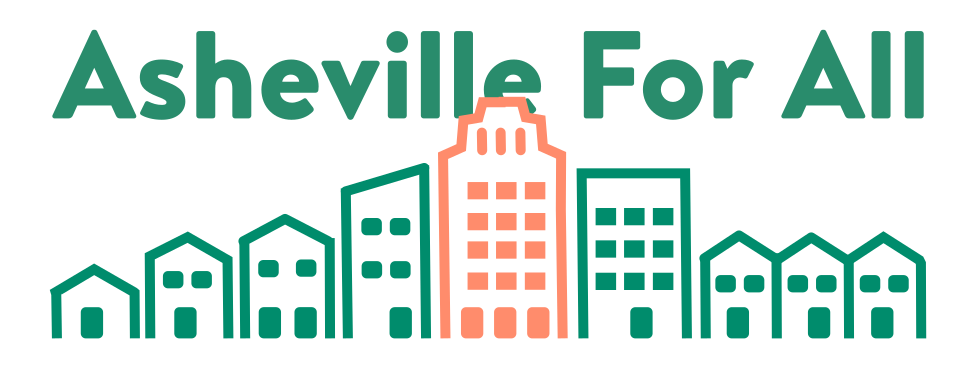Asheville For All Backs Housing Bond; Calls for Municipal Zoning Reform
FOR IMMEDIATE RELEASE
ASHEVILLE— The pro-housing organization Asheville For All is endorsing a $40 million dollar housing bond up for a referendum vote this November in Buncombe County. Additionally, the group calls for cities and towns in Buncombe County to pass zoning reform so that the housing proposed in the bond package can be constructed where it makes the most sense for working families.
On November 8th, Buncombe County voters will have a chance to vote on a bond to subsidize the construction of new multi-family homes. The new buildings will be required to include income-restricted homes which cap the maximum rent that can be charged.
Asheville For All co-founder Andrew Paul states his organization’s approval for the housing bond. “Both bonds in the referendum will add up to a $32 price tag for the median property owner. That’s a small price to pay to help keep our friends, community members, and children from being pushed out of Western North Carolina.”
Asheville and Buncombe County are suffering a housing supply crisis, with record low vacancies of both owner-occupied houses and rental homes. The shortage of homes has contributed to rents and sale prices skyrocketing, leading to displacement and homelessness.
Asheville For All also calls for the county’s cities and towns to change their exclusionary zoning codes and upzone existing, core neighborhoods.
Rowhouses, duplexes, condominiums, and apartment buildings are illegal to build in much of the county because of development ordinances that housing activists, scholars, and White House officials all refer to as “exclusionary zoning.”
These ordinances can prevent builders from creating new homes where they are most desired, in places that are close to jobs, infrastructure, and public transit. Builders may request Variances, Special Use Permits, and Conditional Zoning within zoning reviews, but these processes can be lengthy and costly.
“If the bonds are approved and Buncombe County is ready to pitch in on building much-needed housing, the County and its municipalities may find that their own outdated zoning ordinances block otherwise good and worthy projects,” says Paul. “That’s why for the bond initiative to be most effective, we need to tackle the zoning issue too.”
Exclusionary zoning is a significant factor in high housing costs and housing scarcity, and has been shown to perpetuate neighborhood segregation by race and by class.
Towns and cities across the country are reforming their zoning ordinances to move away from restrictive and exclusionary codes. Grand Rapids, Michigan; Portland, Oregon; Gainesville, Florida; and most recently, Charlotte, North Carolina have all eliminated “single family only” zoning.
In addition to increasing housing supply and relieving market pressures, upzoning existing neighborhoods has potential added benefits of mitigating sprawl, permitting more climate-friendly, walkable, mixed-use neighborhoods, and reducing fossil fuel consumption.
About Asheville For All
Asheville For All is a 501c4 organization that advocates for housing abundance and diverse, walkable, and affordable communities. It was established in spring of 2022. Asheville For All is a member of YIMBY Action, a nationwide pro-housing nonprofit with over thirty chapters in more than a dozen states.
